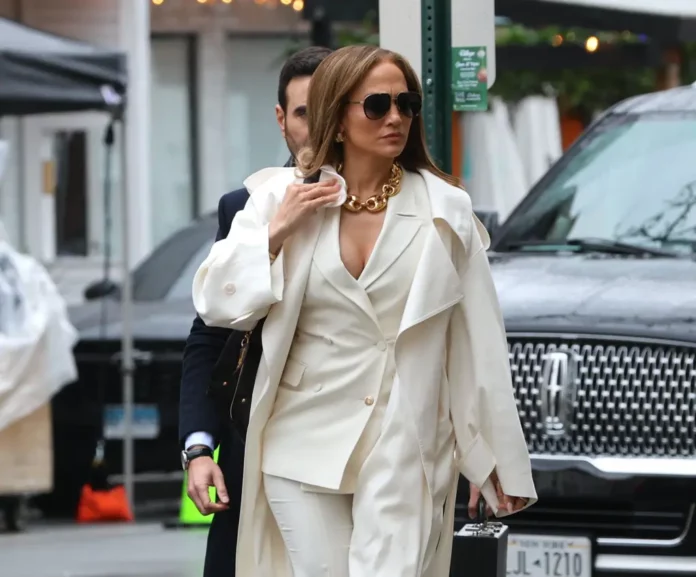
Three Things to Know Before You Scroll
- Selfies with Strings Attached: Jennifer Lopez is being sued for posting professionally taken photos of herself without securing permission from the copyright holders.
- Repeat Offender? This isn’t Lopez’s first copyright controversy. She faced a similar lawsuit in 2019 involving a photo with Alex Rodriguez.
- A Legal Fashion Faux Pas: The lawsuit alleges her posts were used to promote both her image and the designer’s brand—all without compensating the creatives behind the lens.
By Samuel Lopez – USA Herald
NEW YORK (USA Herald) – Jennifer Lopez, the internationally recognized singer, actress, and style icon, is facing two federal lawsuits in California over a social media post she made in January. While Lopez may have shared the glamorous image of herself to inspire her followers during Golden Globes weekend, two plaintiffs say it was a move that broke the law.
On May 17, celebrity photographer Edwin Blanco and photo agency Backgrid USA filed separate but related complaints accusing Lopez of infringing on their intellectual property rights. At the heart of the dispute are several images Blanco captured of Lopez as she arrived at a pre-Golden Globes event held at the Chateau Marmont in Los Angeles. The photos show Lopez wearing a white dress paired with a faux fur coat designed by Adrienne Landau—a look that reportedly turned heads and spurred fan and fashion industry engagement across platforms.
According to court documents, Lopez posted the images to her Instagram and X accounts (formerly Twitter) on January 5, under the caption: “GG Weekend Glamour.” However, Blanco and Backgrid argue she never obtained permission or paid to use the images. The lawsuit claims the unauthorized use was not only a violation of copyright, but a deliberate act intended to boost Lopez’s online brand, visibility, and engagement.
Backgrid and Blanco allege that the images quickly went viral after Lopez shared them, with multiple fashion outlets, fan pages, and even Adrienne Landau’s official Instagram account reposting the pictures. According to the plaintiffs, the photographs generated significant promotional value for both the designer and Lopez herself, yet neither Blanco nor Backgrid received compensation.
Their attorneys described Lopez’s social media post as “particularly egregious,” stating, “Defendants directly leveraged Plaintiffs’ photographs to market branded products and public appearances.”
This isn’t Lopez’s first brush with copyright infringement claims. In 2019, she was sued for sharing an unauthorized paparazzi photo of herself with then-fiancé Alex Rodriguez on Instagram. That case was also brought by a photographer who owned the rights to the image and alleged that Lopez used it for publicity purposes without a license.
In the present case, attorneys for Blanco and Backgrid assert that after reaching out to Lopez’s team shortly after the post was made, the parties entered into oral settlement discussions. A representative for the plaintiffs said the talks were “fruitful,” and Lopez allegedly agreed to a financial settlement. However, according to the complaints, she failed to sign a written agreement or pay the amount discussed, prompting the plaintiffs to file formal litigation.
They are now seeking statutory damages of up to $150,000 per image, per the federal Copyright Act. This means Lopez could be facing hundreds of thousands of dollars in liability for a single post.
Copyright law in the United States grants authors and creators of original works—like photographers—exclusive rights to reproduce, distribute, and publicly display their works. Even when the subject of a photograph is a celebrity, copyright ownership remains with the photographer unless otherwise agreed upon in writing. The law does not recognize fame or the subject’s identity as justification for reproduction without a license.
This legal principle has become increasingly contentious in the social media age, where celebrities routinely share candid, paparazzi, or professional photos of themselves without licensing the images. Some argue that it’s unfair for celebrities to pay for photos taken of them in public, while others maintain that photographers deserve to be compensated for their creative work, regardless of the subject.
The lawsuits against Lopez reflect a growing pattern of litigation aimed at enforcing photographer rights in the digital era. Agencies like Backgrid have sued numerous public figures—including Gigi Hadid, Emily Ratajkowski, and Justin Bieber—for similar alleged infringements. These lawsuits raise fundamental questions about the nature of celebrity, publicity, and digital ownership.
In the eyes of the law, it is not enough to be the subject of a photo; one must secure a license to publish it. For creators, these rights are sacrosanct. For celebrities and influencers, they are legal landmines waiting to be triggered with a single post.
While Lopez has yet to publicly respond to the complaints, the case serves as a stark reminder of the risks associated with managing a high-profile online brand. Whether her post was an innocent oversight or a deliberate tactic, the financial and reputational consequences could be significant.
Explore More
🔗 Follow us on X @RealUSAHerald


